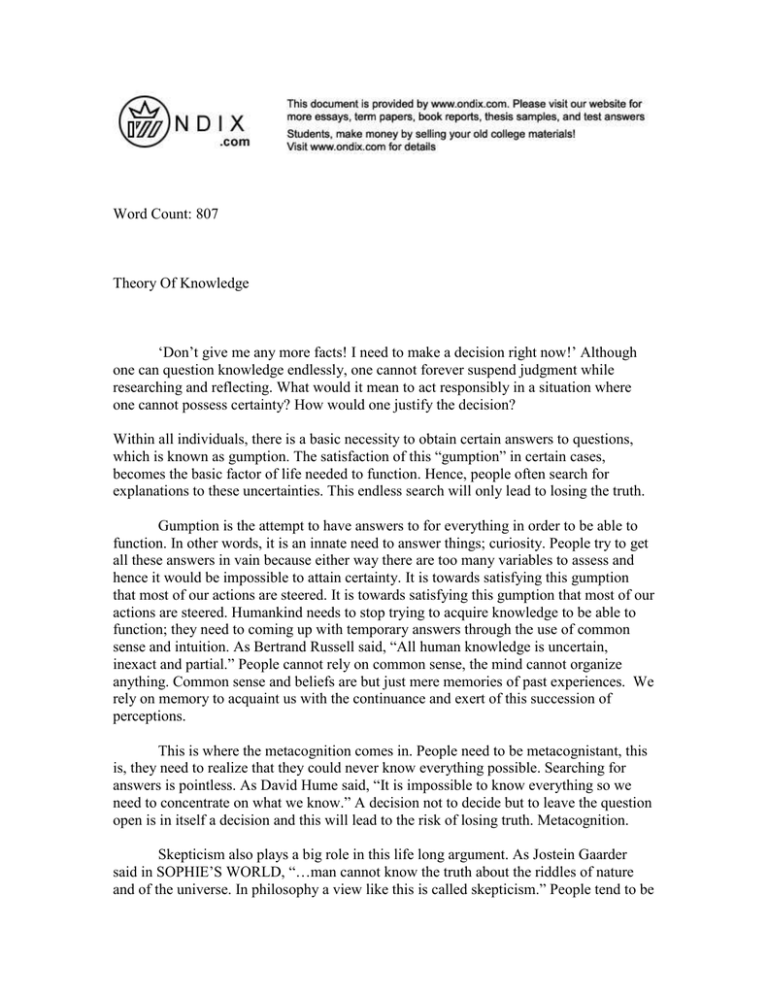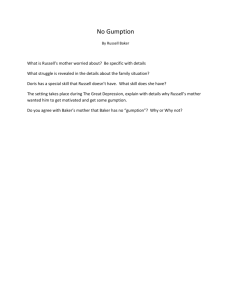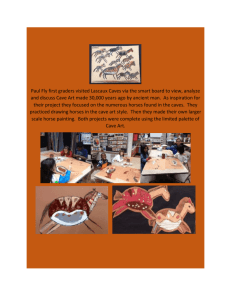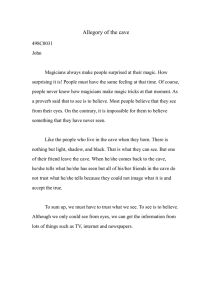Word Count: 807 Theory Of Knowledge
advertisement

Word Count: 807 Theory Of Knowledge ‘Don’t give me any more facts! I need to make a decision right now!’ Although one can question knowledge endlessly, one cannot forever suspend judgment while researching and reflecting. What would it mean to act responsibly in a situation where one cannot possess certainty? How would one justify the decision? Within all individuals, there is a basic necessity to obtain certain answers to questions, which is known as gumption. The satisfaction of this “gumption” in certain cases, becomes the basic factor of life needed to function. Hence, people often search for explanations to these uncertainties. This endless search will only lead to losing the truth. Gumption is the attempt to have answers to for everything in order to be able to function. In other words, it is an innate need to answer things; curiosity. People try to get all these answers in vain because either way there are too many variables to assess and hence it would be impossible to attain certainty. It is towards satisfying this gumption that most of our actions are steered. It is towards satisfying this gumption that most of our actions are steered. Humankind needs to stop trying to acquire knowledge to be able to function; they need to coming up with temporary answers through the use of common sense and intuition. As Bertrand Russell said, “All human knowledge is uncertain, inexact and partial.” People cannot rely on common sense, the mind cannot organize anything. Common sense and beliefs are but just mere memories of past experiences. We rely on memory to acquaint us with the continuance and exert of this succession of perceptions. This is where the metacognition comes in. People need to be metacognistant, this is, they need to realize that they could never know everything possible. Searching for answers is pointless. As David Hume said, “It is impossible to know everything so we need to concentrate on what we know.” A decision not to decide but to leave the question open is in itself a decision and this will lead to the risk of losing truth. Metacognition. Skepticism also plays a big role in this life long argument. As Jostein Gaarder said in SOPHIE’S WORLD, “…man cannot know the truth about the riddles of nature and of the universe. In philosophy a view like this is called skepticism.” People tend to be skeptical, where knowledge is uncertain. They want to avoid error. In this frame of mind, humanity will have a better change of understanding the universe. Having uncertain answers will help humans function properly. This leads us to Plato’s cave. Picture yourself inside a cave viewing uncertain images, shadows. These are the only things you have ever seen. You don’t have a clear understanding of these images; yet these images is the only thing you know of this universe. You create an answer to what these viewing are. The answers you create are according to your past experiences, but as soon as you leave the cave, you are confronted with what seems to be the real thing. Yet, al of a sudden, you view a whole new “ballgame.” All of your answers and conclusions of the “old world”, behind the cave, and questioned by the “new world.” You refuse the answers of the “new world” in fear of being wrong. As William James said in THE WILL TO BELIEVE, “it is better to risk loss of truth than chance of error.” The eternal search for truth will only lead to more confusion. In the same essay, William James wrote, “Our passional nature not only lawfully may, But must, decide an opinion between propositions, whenever it is a genuine option that cannot by its nature be decided on intellectual grounds; for to say, under such circumstances, ‘Do not decide, but leave the question open,’ is itself a passional decision, just like deciding yes or no, and is attended with the same risk of losing truth….” If we have the option between losing truth and gaining it, this option is not at all important or consequential. We can avoid the chance of gaining truth and by this manner; we can save ourselves from any chance of believing falsehood by no making a decision until all the conclusive evidence is laid before us. There is no way that we can ever know everything so acting responsibly would mean to be metacognistant and to go out into the world and share what little you know with the rest of the world. People need to get out of their philosophical cave where they refuse to believe anything outside their Salazar 2 “world” because not enough evidence is presented. They need to get out into the unknown world and bring back the new ideas they obtained to the cave so as to come up with a universal truth, hence satisfy that gumption to have an answer. Keywords: word count theory knowledge give more facts need make decision right although question knowledge endlessly cannot forever suspend judgment while researching reflecting what would mean responsibly situation where cannot possess certainty would justify decision within individuals there basic necessity obtain certain answers questions which known gumption satisfaction this gumption certain cases becomes basic factor life needed function hence people often search explanations these uncertainties this endless search will only lead losing truth gumption attempt have answers everything order able function other words innate need answer things curiosity people these answers vain because either there many variables assess hence would impossible attain certainty towards satisfying this that most actions steered towards satisfying that most actions steered humankind needs stop trying acquire knowledge able function they need coming with temporary through common sense intuition bertrand russell said human uncertain inexact partial people cannot rely common sense mind organize anything common sense beliefs just mere memories past experiences rely memory acquaint with continuance exert succession perceptions where metacognition comes metacognistant they realize that they could never know everything possible searching pointless david hume said impossible know everything concentrate what know decision decide leave question open itself will lead risk losing truth metacognition skepticism also plays role life long argument jostein gaarder said sophie world truth about riddles nature universe philosophy view like called skepticism tend skeptical where uncertain want avoid error frame mind humanity will have better change understanding universe having uncertain help humans properly leads plato cave picture yourself inside cave viewing images shadows these only things have ever seen clear understanding images images only thing universe create answer what viewing create according your past experiences soon leave cave confronted with seems real thing sudden view whole ballgame your conclusions world behind questioned world refuse fear being wrong william james believe better risk loss than chance error eternal search lead more confusion same essay william james wrote passional nature lawfully must decide opinion between propositions whenever genuine option nature decided intellectual grounds under such circumstances decide leave question open itself passional just like deciding attended same risk losing option between gaining option important consequential avoid chance gaining manner save ourselves from chance believing falsehood making until conclusive evidence laid before there ever acting responsibly mean metacognistant into share little rest their philosophical refuse believe anything outside their salazar because enough evidence presented into unknown bring back ideas obtained come universal hence satisfy answer Keywords General: Essay, essays, termpaper, term paper, termpapers, term papers, book reports, study, college, thesis, dessertation, test answers, free research, book research, study help, download essay, download term papers


